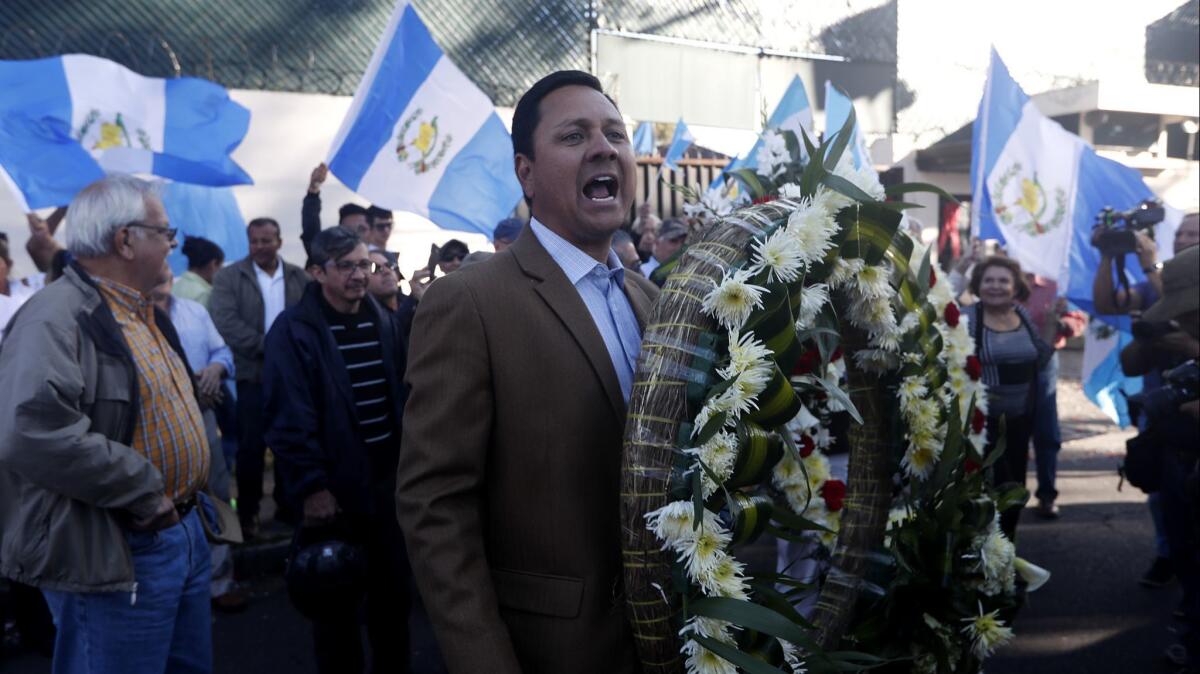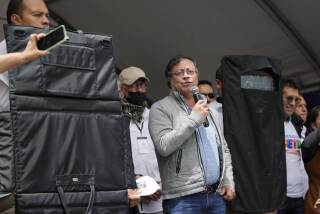A U.N. anti-corruption commission is fleeing Guatemala after president’s order

- Share via
Reporting from Mexico City — Members of a widely respected anti-corruption commission began leaving Guatemala on Tuesday, one day after being ordered out by President Jimmy Morales, who was among its many powerful targets.
“Given the risks ... international personnel have been asked to leave the country until further notice,” said Matias Ponce, a spokesman for the U.N.-backed International Commission Against Impunity in Guatemala, which has worked with local prosecutors to jail dozens of legislators and three ex-presidents and has been lauded as a model for fighting crime.
The commission is investigating Morales’ campaign financing and has pursued corruption investigations against two members of his family and several current members of Congress.
Guatemala’s abrupt announcement that it was expelling the group drew international condemnation and sparked fears that the country’s democracy was at risk. The expulsion order defies rulings from the Constitutional Court — the country’s highest judicial body — that guarantee commission members the right to work in Guatemala.
Defenders of the commission say the expulsion also violates the terms of the Vienna Convention, which governs international agreements.
On Tuesday, the Constitutional Court considered several legal challenges to the expulsion by civil society groups. As the court deliberated, it requested that the government provide more information about why it decided to expel the commission.
Morales has complained that the commission — which was formed in 2006 to conduct independent investigations into graft, drug trafficking and genocide in the war-scarred Central American nation — violates Guatemalan sovereignty and is politically motivated.
He has spent months trying to dismantle it, despite coming to office on an anti-corruption platform.
Morales had previously attempted to bar the head of the commission from entering Guatemala, and this fall said he would not extend the commission’s current two-year mandate, which is set to expire in September.
His government has helped organize protests in recent days of people who oppose the commission, and it earned the support of one of the country’s largest business groups, which said in a statement that the commission helped “foment polarization and divide political opinion on the efforts to fight corruption.”
Critics of Morales said the president is expelling the commission to protect himself.
“The objective here is to prevent corruption cases from moving forward and ensuring impunity for the people in power,” said Adriana Beltran, an analyst with the Washington Office on Latin America think tank. “The rule of law and the future of the country are at stake.”
It is unclear whether the government will comply if the high court decides, as it has in the past, that the commission, known as the CICIG, has the right to continue doing its work. Several members of Congress have proposed removing judges on the court who have supported the commission, or dissolving the Constitutional Court altogether.
Claudia Escobar, a legal scholar and former Guatemalan Appeals Court judge, said she believes Morales and the Congress “are looking to create complete control” ahead of national elections scheduled for June.
“To destroy and attack the CICIG, they have to destroy the country’s institutions,” she said.
The United States was instrumental in creating the commission, part of a wider effort to fight corruption in a region where political instability and economic inequality have contributed to large-scale migration north. The U.S. provides about half of the commission’s $15-million annual budget.
On Tuesday, the State Department released a statement saying “the United States is concerned about the future of anti-corruption efforts in Guatemala,” though it failed to mention the ouster of the commission explicitly.
“Rule of law, reduced corruption, and an end to impunity are key to security, stability, and prosperity, not only in Guatemala, but throughout the region,” the statement said. “The U.S. government remains committed to supporting Guatemalan institutions and the Guatemalan people in their ongoing fight against corruption and impunity.”
Twitter: @katelinthicum
Staff writer Tracy Wilkinson contributed to this report from Amman, Jordan.
More to Read
Sign up for Essential California
The most important California stories and recommendations in your inbox every morning.
You may occasionally receive promotional content from the Los Angeles Times.














